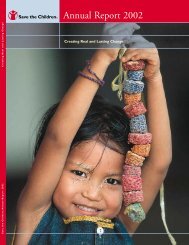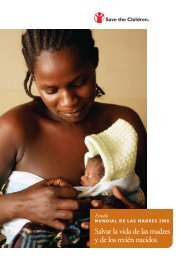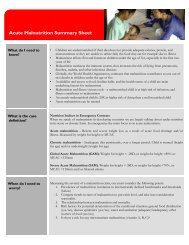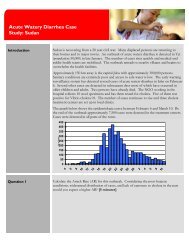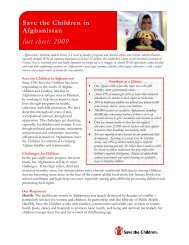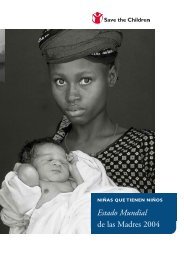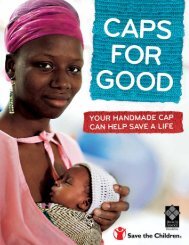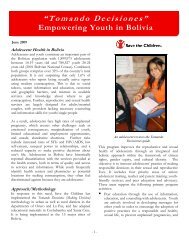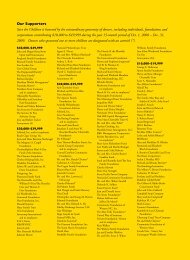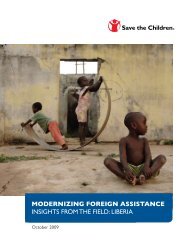Adolescent Sexual and Reproductive Health Toolkit for - UNFPA
Adolescent Sexual and Reproductive Health Toolkit for - UNFPA
Adolescent Sexual and Reproductive Health Toolkit for - UNFPA
You also want an ePaper? Increase the reach of your titles
YUMPU automatically turns print PDFs into web optimized ePapers that Google loves.
The most challenging aspect of peer education<br />
programs is ensuring quality. To do so,<br />
programmers must:<br />
• Provide high quality, intensive training to peer<br />
educators, including regular assessments <strong>and</strong><br />
rein<strong>for</strong>cement of their capacities to provide<br />
accurate in<strong>for</strong>mation to their peers.<br />
• Ensure that trainings include topics relevant to<br />
adolescents in emergencies, such as sexual <strong>and</strong><br />
reproductive health, sexual abuse <strong>and</strong> exploitation,<br />
HIV/AIDS prevention, l<strong>and</strong>mine safety, sexual <strong>and</strong><br />
gender-based violence, conflict resolution, personal<br />
health <strong>and</strong> safety.<br />
• Use st<strong>and</strong>ardized checklists in the development <strong>and</strong><br />
implementation of peer education programs to<br />
improve quality.<br />
The following is the most widely used source to help<br />
improve the quality of peer education programs.<br />
Youth Peer Education <strong>Toolkit</strong><br />
The kit contains five resources (shown below).<br />
Designed to help program managers <strong>and</strong> master<br />
trainers of youth peer educators, the tools are based<br />
on research <strong>and</strong> evidence from the field as well as<br />
local examples <strong>and</strong> experiences. The toolkit was a<br />
collaboration between the United Nations Population<br />
Fund (<strong>UNFPA</strong>) <strong>and</strong> Family <strong>Health</strong> International/<br />
YouthNet, working with the Youth Peer Education<br />
Network (Y-PEER), a project coordinated by <strong>UNFPA</strong>.<br />
(2005-2006)<br />
• Training of Trainers manual<br />
• St<strong>and</strong>ards <strong>for</strong> peer education<br />
• Assessment tool <strong>for</strong> peer education programs<br />
• Per<strong>for</strong>mance improvement tool <strong>for</strong> managers<br />
• Theater-based techniques training manual<br />
http://www.info<strong>for</strong>health.org/youthwg/<br />
peeredtoolkit.shtml<br />
Suggested Reading:<br />
1. <strong>UNFPA</strong>, FHI/YouthNet. St<strong>and</strong>ards <strong>for</strong> Peer Education Programmes. <strong>UNFPA</strong>, 2005.<br />
http://www.fhi.org/en/Youth/YouthNet/Publications/peeredtoolkit/St<strong>and</strong>ards.htm.<br />
Community-Based Distribution <strong>and</strong> Peer Education Tools<br />
79



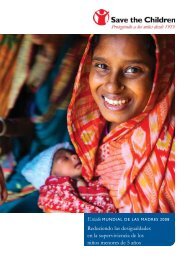
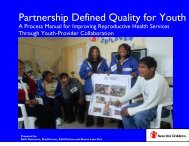
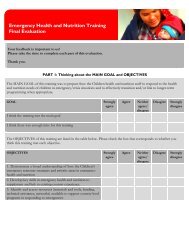
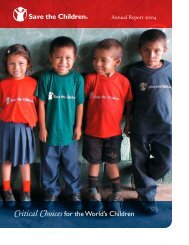
![View full document [PDF 3.39 MB] - PreventionWeb](https://img.yumpu.com/27308954/1/190x245/view-full-document-pdf-339-mb-preventionweb.jpg?quality=85)
